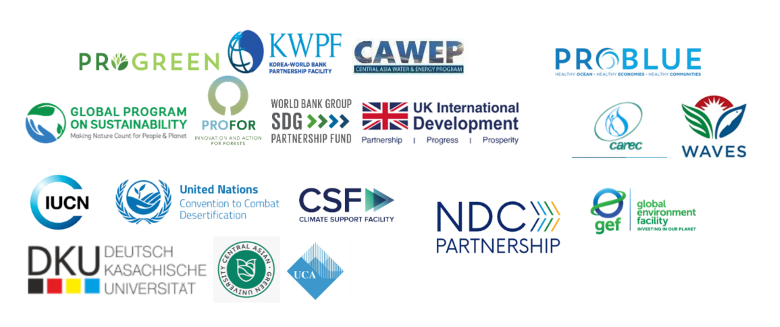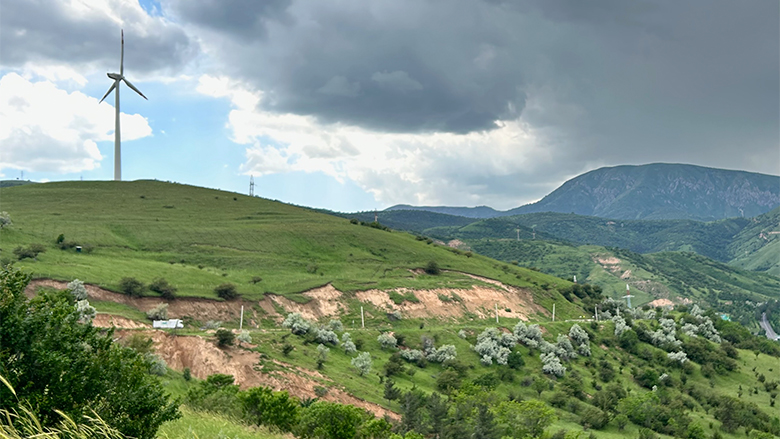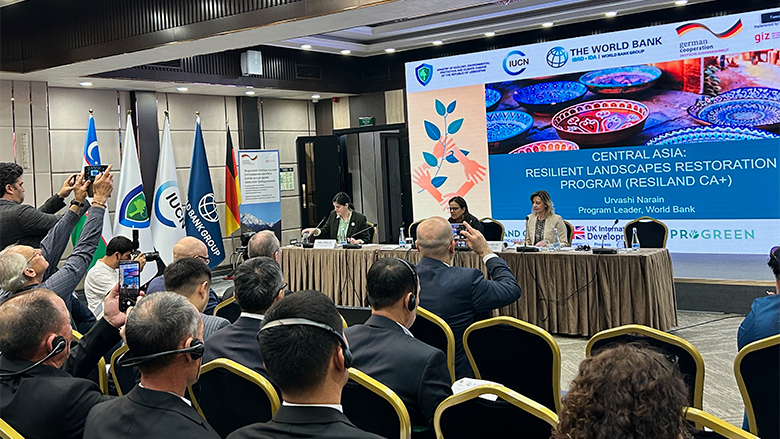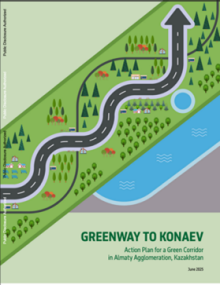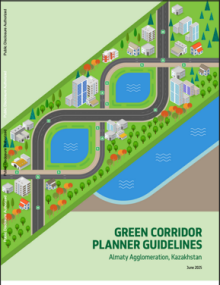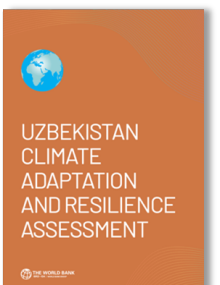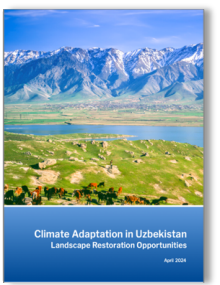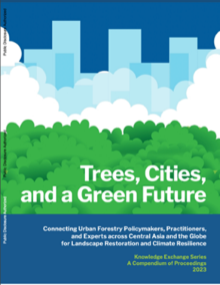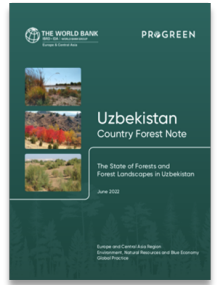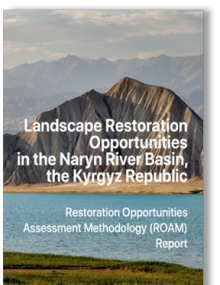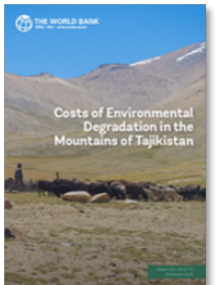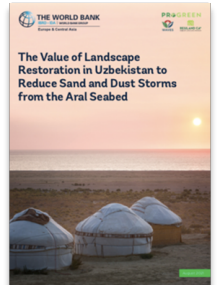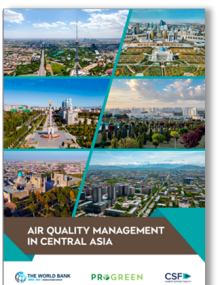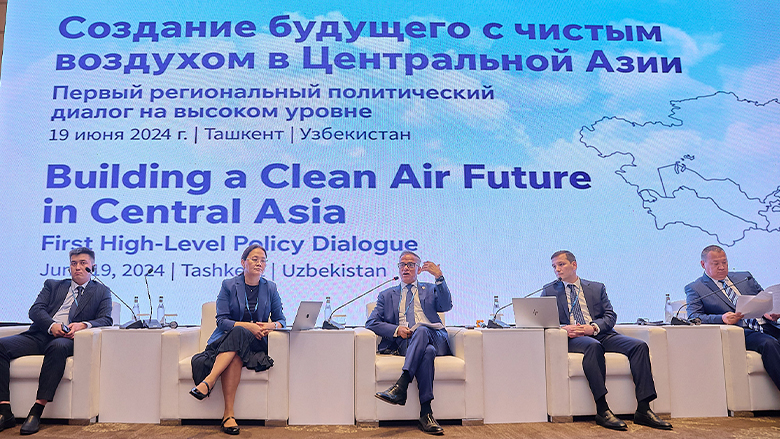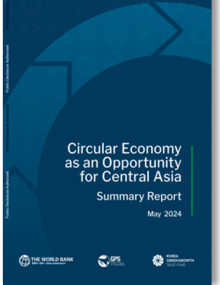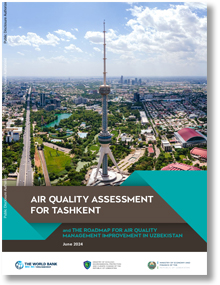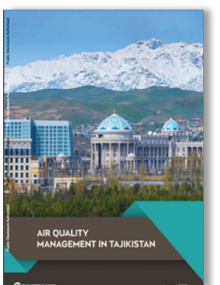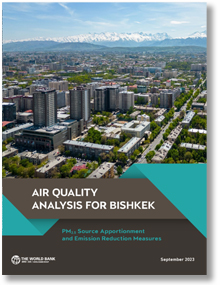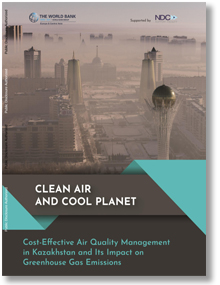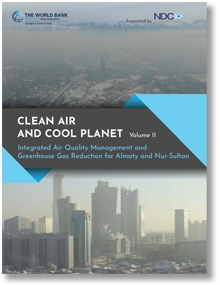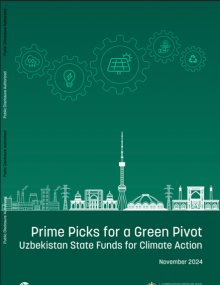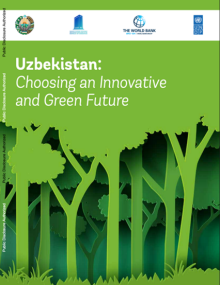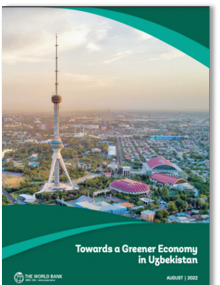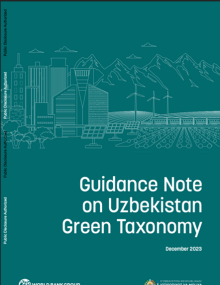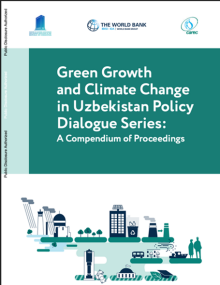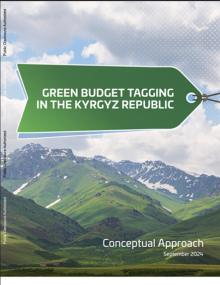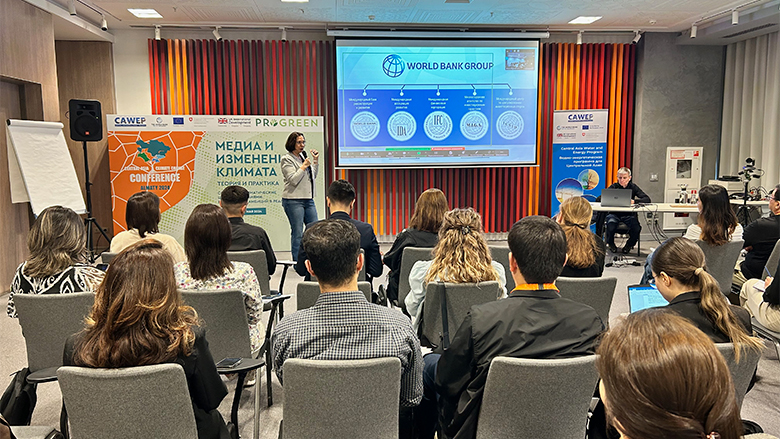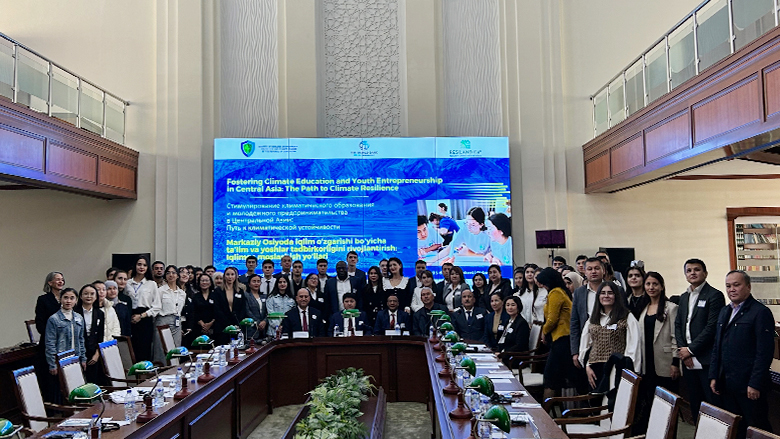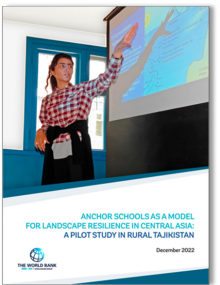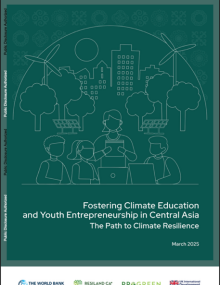The Resilient Landscapes Restoration (RESILAND) Program in Central Asia
Central Asia's drylands is a region confronting complex challenges related to land degradation, heightened vulnerability to climate-change driven extreme weather events, and natural hazards. It also is experiencing increasing pressures from human activity such as converting land to intensified commercial agriculture, logging, and pasturing. Land degradation has vast economic costs for the region — on average, 6 percent of Central Asia’s GDP.
With border areas representing hotspots for land degradation and poverty, addressing regionality aspects and building resilience to fragility in border regions are crucial. This includes deepening dialogue on regional policies, regional knowledge generation and sharing, and supporting youth with access to jobs.
The region includes the Aralkum Desert, the former seabed of the Aral Sea. This vast area of 60,000 square kilometers is a major source of sand and toxic dust storms, which harm public health, degrade soil and air quality, and disrupt local economies. Uzbekistan has undertaken bold afforestation efforts, which already have restored 500,000 hectares of degraded land, achieving a Bonn Challenge milestone a decade ahead of schedule. The recently completed World Bank-supported $45 million Climate Adaptation and Mitigation Program for the Aral Sea Basin Project (CAMP4ASB) for Central Asia contributed enhanced climate resilience, sustainable agricultural practices, strengthened regional cooperation and empowered communities in the Aral Sea Basin region. The project implemented 310 micro-projects on climate-smart agriculture, benefiting more than 50,000 people in Tajikistan and Uzbekistan.
World Bank Finance
Since 2019, The World Bank's flagship $256 million Central Asia Resilient Landscapes Restoration Program (RESILAND CA) in Kazakhstan, the Kyrgyz Republic, Tajikistan, and Uzbekistan, and advisory services in Turkmenistan aims to build on this progress by addressing land degradation and bolstering resilience to climate change in targeted degraded transboundary landscapes and fragile border regions across Central Asia. Through strengthened transboundary cooperation in restoring landscapes and building climate resilience as a cornerstone of food, water, and energy security, RESILAND CA aims to restore degraded forests and pastures, reduce fragility of border areas, and improve livelihoods of border communities.
The $6 million RESILAND Kazakhstan, $52 million RESILAND Kyrgyz Republic, $45 million RESILAND Tajikistan, and $153 million RESILAND Uzbekistan national projects work toward tangible and sustainable results on the ground especially in border areas as these are most impacted by land degradation, direct benefits to transboundary ecosystem, infrastructure, and communities living in the border areas. They serve as effective and replicable models at a global level for addressing national and regional land degradation, building resilience to climate change and improving livelihoods. Specific interventions include:
- Implementing private-sector, community- and farmer-centered landscape restoration using drought-resistant species of trees and shrubs
- Monitoring climate-change induced hazards and investing in nature-based, green and grey solutions to mitigate impacts of mudflows and floods
- Promoting ecotourism and engaging communities in afforestation efforts, rehabilitating degraded natural habitats and protective infrastructure
- Supporting communities in diversifying economic activities to reduce pressure on pastures and forests.
- Establishing jointly managed transboundary protected areas and peace parks to preserve biodiversity across transboundary corridors and strengthen regional collaboration on landscape restoration.
- Developing skills with youth and creating jobs
Understanding that nature, landscapes, and ecosystems know no borders, RESILAND CA fosters regional collaboration across Central Asia's shared borders and ecosystems. This contributes to improved connectivity of natural resources and increased greenhouse gas mitigation and greater resilience to impacts of climate change. RESILAND also contributes to establishing jointly managed transboundary protected areas and peace parks to preserve biodiversity across transboundary corridors and strengthen regional collaboration on landscape restoration.
These interventions benefit transboundary ecosystems, infrastructure, and local communities while serving as global models for sustainable landscape restoration. Key interventions include drought-resistant tree planting, mitigating climate-induced hazards through nature-based and engineered solutions, promoting ecotourism and afforestation, diversifying livelihoods to ease pressure on natural resources, and establishing transboundary protected areas to preserve biodiversity and foster regional collaboration.
RESILAND Country Projects
Kazakhstan
The $6 million RESILAND Kazakhstan project is a pioneering effort to address land degradation through sustainable landscape restoration. Funded by the Global Environment Facility (GEF,) and supported by PROGREEN, the project focuses on strengthening institutional capacities and piloting agroforestry initiatives, such as planting apple and pear orchards. These efforts target degraded productive lands and key habitats, addressing the country’s limited forest cover of just 4.7%. The initiative also supports the cultivation, production, and storage of climate-adaptive seedlings, ensuring Kazakhstan’s readiness for climate challenges. By aligning with Kazakhstan’s goal of planting two billion trees by 2025, this project reflects a strong commitment to the Kunming-Montreal Global Biodiversity Framework and sustainable development. Beyond its immediate impacts, the project contributes to global models of combating land degradation, enhancing biodiversity, and building resilience to climate change, setting an example for other countries.
Kyrgyz Republic
$52 million RESILAND Kyrgyz Republic aims to mitigate landslides, flash floods, and mudflows, particularly in the southern regions of Osh and Jalal-Abad BY promoting sustainable landscape management. Funded by the World Bank, PROGREEN, and the Korea-World Bank Group Partnership Facility, the project integrates nature-based solutions with grey infrastructure like embankments and riprap for riverbank protection. It directly benefits over 50,000 rural residents, including vulnerable groups and women, across key regions like Jalal-Abad, Osh, Issyk-Kul, and Naryn. The project emphasizes community engagement through initiatives such as the Green Wager Program, which employs local labor for green restoration activities. Additionally, it promotes sustainable livelihoods by providing training and market access through the proven "One Village One Product" method. By enhancing disaster monitoring systems and implementing climate-resilient solutions, the project not only strengthens local resilience but also fosters regional collaboration on transboundary landscape restoration, ensuring the health and sustainability of shared ecosystems.
Tajikistan
The $45 million RESILAND Tajikistan project aims to address land degradation and soil erosion that threaten the livelihoods of rural communities. Launched in November 2022, the project focuses on creating harmonized regional policies for transboundary landscape restoration and involves over 16,000 rural residents across the Sughd, Khatlon, and Gorno-Badakhshan Autonomous Oblast (GBAO) regions. Key activities include integrated pasture and forest management, biodiversity conservation, and the development of protected areas. Sub-grants support community-led initiatives, such as greenhouse construction, irrigation system rehabilitation, and agricultural equipment purchases. To date, 613 common interest groups have been formed, with 250 business plans submitted to improve livelihoods and combat land degradation. The project also invests in geobotanical surveys and infrastructure to access remote pastures, ensuring sustainable livestock management. By empowering local communities, building institutional capacity, and restoring degraded landscapes, RESILAND Tajikistan creates a foundation for long-term resilience and economic growth.
Turkmenistan
In Turkmenistan, the World Bank is currently completing a study, Turkmenistan Landscapes: Opportunities for Restoration and Livelihoods, to identify hotspots of land degradation and declining land productivity along with areas of adaptation opportunity where landscape restoration can best offset these trends under changing climate conditions. The study shows that from the economic point of view, it is significantly cheaper to implement land restoration interventions than not taking any action. It calls for increased funding for landscape adaptation and restoration initiatives and offers area for initial action.
Uzbekistan
The $153 million RESILAND Uzbekistan tackles one of the world’s most pressing environmental crises: the degradation of the Aralkum Desert, the former seabed of the Aral Sea. This vast, desolate area of 60,000 square kilometers is a major source of sand and toxic dust storms, which harm public health, degrade air quality, and disrupt local economies. With annual economic losses in Karakalpakstan estimated at $44.2 million, the stakes are high. Uzbekistan’s bold afforestation efforts have already restored 500,000 hectares of degraded land by 2020, achieving a Bonn Challenge milestone a decade ahead of schedule. The RESILAND project aims to build on this progress by increasing the area under sustainable landscape management and reducing the frequency of dust storms. Interventions include planting vegetation to stabilize soils, investing in nature-based solutions, and strengthening institutions for transboundary collaboration with neighboring countries. With an estimated $39 million in annual economic benefits from restored ecosystem services, the project not only addresses environmental degradation but also supports livelihoods and regional cooperation. By advancing sustainable landscape restoration, Uzbekistan positions itself as a leader in tackling climate and ecological challenges in Central Asia.
Knowledge Sharing across Central Asia, South Caucasus, and beyond
Knowledge sharing plays a crucial role in improving regional connectivity and collaboration among key stakeholders. With this aim, under RESILAND CA, the World Bank supports Central Asia countries to strengthen regional dialogue and coordinate regional climate action. In partnership with Regional Environmental Center for Central Asia (CAREC), the World Bank is supporting the annual Central Asia Climate Change Conference (CACCC) to review regional progress in climate change mitigation and adaptation and explore new initiatives for climate resilience, including bolstering regional cooperation to address climate change. The 2024 conference gathered over 500 policy- and decision makers from across Central Asia, international development partners, civil society, the private sector, and academia. Participants reviewed progress, challenges, and gaps in implementing climate commitments and green transition. They also explored collective action to reduce climate-related disaster risks. Stay tunes for updates on the next CACCC, to be held in May in Ashgabat, Turkmenistan.
RESILAND CA now serves as a replicable model to tackle similar challenges in arid landscapes around the world. For example, In Armenia, where afforestation has been identified as a strategic area for socioeconomic development, almost $10 million was approved for the Armenia Resilient Landscapes Project in May 2024. The Armenia RESILAND project will contribute to forest, wetland, and mining site restoration and to the development of ecotourism and strengthening of institutional capacities. In North Africa's Sahel, the RESILAND model is being adopted to support national and regional efforts to enhance resilience against the effects of land degradation by supporting integrated landscape approaches through technical assistance, policy support, and investments for Sahel countries.
The World Bank through its RESILAND program is committed to promoting knowledge exchange among Central Asian countries and development partners. Over the last year RESILAND supported the 21st session of the Committee on the Implementation of the UN Convention to Combat Desertification (CRIC-21 UNCCD) held in Samarkand, Uzbekistan. The session was focused on the impacts of sand and dust storms and land degradation and included Uzbekistan's Minister of Ecology, Environment and Climate Change, UNCCD Executive Secretary, ECO Deputy Secretary, and other partners among its participants. Globally, Central Asia and China together rank second (after the Sahara Desert) in terms of dust emission into the atmosphere — about 20% of the world’s total. Strengthening the capacity of real-time air pollution monitoring and forecasting with a focus on dust and fine dispersed particles is among urgent measures needed as part of the comprehensive approach.
RESILAND jointly with IUCN Regional Dialogue on Transboundary Conservation in Central Asia held on November 28-30, 2023 in Tashkent, made a significant stride in advancing transboundary conservation agenda. Organized jointly with IUCN under RESILAND CA+ Program, the event brought together nearly 100 government representatives from Kazakhstan, the Kyrgyz Republic, Tajikistan, Turkmenistan, and Uzbekistan, and many national and international organizations. Ecosystems that are divided by borders are often subject to different policy, management, and governance structures. Transboundary conservation is a way to overcome these differences by promoting cooperation between relevant parties of the involved countries.
Publications
Greenway to Konaev: Action Plan for a Green Corridor in Almaty Agglomeration, Kazakhstan English | Russian
Green Corridor Planner Guidelines: Almaty Agglomeration, Kazakhstan English | Russian
Uzbekistan Climate Adaptation and Resilience Assessment English | Russian
Climate Adaptation in Uzbekistan: Landscape Restoration Opportunities English | Russian
Trees, Cities, and a Green Future: Connecting Urban Forestry Policymakers, Practitioners, and Experts across Central Asia and the Globe for Landscape Restoration and Climate Resilience English | Russian
Uzbekistan Country Forest Note
English
Valuing Green Infrastructure: A Case Study of the Vakhsh River Basin, Tajikistan English
Landscape Restoration Opportunities in the Naryn River Basin, the Kyrgyz Republic English | Russian
Costs of Environmental Degradation in the Mountains of Tajikistan English
The Value of Landscape Restoration in Uzbekistan to Reduce Sand and Dust Storms from the Aral Seabed English
Related Links
PRESS RELEASE: Degraded Lands and Forests Across Uzbekistan to be restored with World Bank Support
FEATURE: Nurturing Landscapes, Communities, and Climate Resilience in Kazakhstan
BLOG: Rethinking landscape restoration in Central Asia to improve lives and livelihoods
BLOG: Why Tajikistan must strengthen the resilience of its forests and restore its landscapes
BLOG: In Uzbekistan, policy dialogue builds momentum for transition to a green economy
BLOG: Protecting Central Asia’s mountains and landscapes to transform people’s lives and livelihoods
BLOG: Restoring Uzbekistan’s landscapes: Lessons from a virtual field trip
BLOG: Global knowledge will make tomorrow's forests and landscapes more resilient
PRESS RELEASE: World Bank Supports the Kyrgyz Republic in Sustainable Landscape Management and Climate Mitigation and Adaptation
BLOG: RESILAND Tajikistan: Real Steps Towards Restoration of Degraded Lands
BLOG: From the Alps to the Pamirs: Investing in mountain economies to make people and places more resilient
FEATURE: Greening the desert: The role of landscape restoration in Uzbekistan's battle against sand and dust storms
PRESS RELEASE: Forests, Wetlands, and Landscapes to Restore in Armenia with World Bank Support
EVENT: Sahel RESILAND: Landscape Restoration for Climate Action and People
